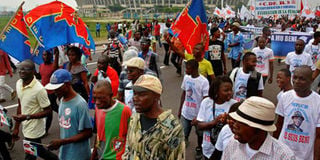Six activists reject Kabila offer for freedom

People hold flags and banners of the Congolese party "Courant Democrates Renovateurs - Reformist Democrat Movement" (CDER) as they march in Kinshasa on May, 26, 2016 during a demonstration against the ruling DR Congo's President Joseph Kabila in power since his father's assassination in 2001. Six Congolese pro-democracy activists have rejected a presidential pardon granted last Friday. PHOTO | AFP
What you need to know:
- The activists were arrested in February after police found them making banners for a general strike calling on President Kabila to step down when his second mandate ends this year.
- After spending four months in jail, DR Congo leader ranted amnesty to the pro-democracy activists, but the activists rejected the clemency, UN-sponsored Radio Okapi reported.
- President Kabila has been cracking down on the opposition, religious and civil society groups that have been mobilising against his intention for a third term.
Six Congolese pro-democracy activists have rejected a presidential pardon granted last Friday.
The members of the Struggle for Change (Lucha) group in the Democratic Republic of Congo were convicted in March and sentenced to six months in prison for incitement to revolt
Ms Kabuo Rebecca, Mr Kambala Matshunga, Mr Kasereka Kamundo, Mr Kambale Serge, Mr Alipenda John and Mr Kasereka Muhima were arrested in February after police found them making banners for a general strike calling on President Kabila to step down when his second mandate ends this year.
After spending four months in jail, DR Congo leader in a presidential decree read on national television channel granted amnesty to the pro-democracy activists, but the activists rejected the clemency, UN-sponsored Radio Okapi reported.
COMPLETE JAIL TERMS
Mr Trésor Akili, a member of the movement based in the Congolese town of Goma told the radio that his colleagues prefer to complete their jail terms in solidarity with other pro-democracy activists, who have not benefited from the presidential gesture, which they consider selective.
President Kabila, who has been in power since 2001 when he replaced his assassinated father, Laurent Desire Kabila, is required by law to step down at the end of his second term on December 19. But in May, the Constitutional Court said he could remain in power if a presidential election was not organised as per schedule.
President Kabila has been cracking down on the opposition, religious and civil society groups that have been mobilising against his intention for a third term. There has been a pattern of arbitrary arrests and detentions by the National Intelligence Agency and trials based on trumped-up charges.





